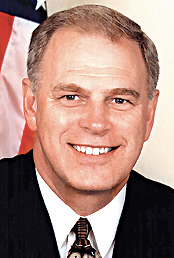

Thursday, January 29, 2009

Ohio Governor Ted Strickland (D-Lisbon)
By Marc Kovac
The Ohio Graduate Test will be tossed, with students required instead to take the ACT college entrance exam.
COLUMBUS — Longer school days and years, mandatory all-day kindergarten and stronger accountability for public school teachers are among the proposals outlined in a broad education reform plan presented Wednesday by Gov. Ted Strickland.
Much of the governor’s State of the State speech focused on education and school funding reform, capping two years of meetings across the state in which the Democratic office holder listened to ideas from teachers, parents and students.
“It sounds great on paper,” said state Sen. Joe Schiavoni of Canfield, D-33rd. “He did a good job laying out his plans, particularly on education.”
Strickland said it’s “absolutely clear” to him that “simply tinkering with centuries-old education practices will not prepare Ohio’s children for success in college, in the workplace, or in life.”
The governor called his plan an “evidence-based” approach to education that will change how and what students are taught.
Math, science and other core classes will remain, with new ones focused on global awareness, life skills, cultural awareness, media literacy, leadership and productivity.
The Ohio Graduate Test will be tossed, with students required instead to take the ACT college entrance exam and complete other requirements, including community service.
“These are the skills that help people thrive in their lives,” he said.
“These are the skills our business leaders look for in the people they hire. These are the skills we find in people who create jobs, create products, and create entirely new industries.”
Strickland also is calling for 20 instructional days to be added to the current school calendar over the next 10 years, bringing the state up to the international average of 200 days.
And he said the state will require universal, all-day kindergarten.
“We will end the outdated practice of giving our most impressionable students only a half-day of learning,” he said.
Under Strickland’s plan, new teachers will be required to complete four-year residency programs in schools before earning their professional teacher’s licenses.
“We will provide collaborative planning time so that the best ideas of the best teachers can spread across a school and reach the most students,” he said.
“Mentoring, coaching and peer review will be a standard part of a teacher’s job.”
He added, “Let me say that not everyone is cut out to be a teacher. And the residency program will identify them. But even for teachers already in the field, we must have the ability to remove them from the classroom if their students are not learning. Right now, it’s harder to dismiss a teacher than any other public employee. Under my plan, we will give administrators the power to dismiss teachers for good cause, the same standard applied to other public employees.”
Strickland said school districts will be required to submit spending plans before each school year and provide an account to the state for every dollar they spent at the end of each school year. Those that repeatedly fail to meet academic and financial standards could have their charters revoked.
“In short, if a school district fails, we will shut it down,” he said.
Strickland also is calling for changes in the way schools are funded.
“... My plan lowers what our local taxpayers are expected to contribute to local schools from 23 mills to 20 mills,” he said.
“The state will assume responsibility for providing the difference between what those 20 mills raise and the cost of the full range of educational resources our students need according to our evidence-based approach.”
Districts will have the option of asking voters to pass conversion levies, which will enable them to net increased tax revenues over time without repeatedly going back to the ballot, Strickland said.
“Last November alone we had more than 200 school districts asking voters to approve school levies,” he said.
“Under my plan, school districts that choose this option will not have to go to the ballot year after year just to stay even with inflation.”
He also used the annual address to reiterate his commitment to not raise taxes, to continue tax reforms instituted under Republicans several years ago, and to retain the Homestead exemption extended to all elderly property owners in the last biennial budget.
And he announced plans for another job stimulus package, less than a year after working with a Republican-led Legislature on a different one.
The new package “will include an expansion of Ohio’s Third Frontier program, regulatory reform and streamlining measures to assure that Ohio gets its share of federal stimulus funds and can put them to work quickly, and additional investments that will create jobs in the short term and strengthen Ohio for generations,” he said.
But Strickland also warned of the continuing economic downturn and its lingering effects on the state’s economy.
Last year, the state lost 100,000 jobs, mainstay companies are hurting and residents’ retirement savings have plummeted, he said. Sales tax, income tax and general revenue funds are projected to decline further.
That means a tight budget and difficult decisions ahead for state services, the governor warned.
SEE ALSO:Valley lawmakers await details of plan.